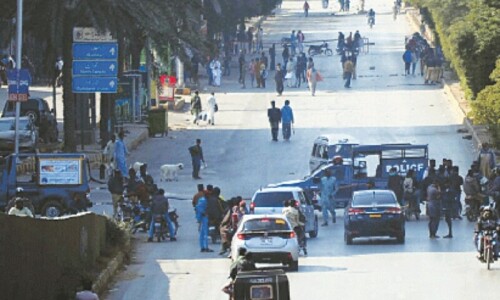 KARACHI: In the case of Jammu and Kashmir, propaganda and twisted versions of history have led to a general perception that the Kashmiri peoples’ desire for freedom and their demand for a say in their own future is spearheaded largely by militants. Nothing could be further from the truth, as is easily evident from the response to Mohammed Yasin Malik’s long march – his Safar-i-Azadi – across that battle-weary land.
KARACHI: In the case of Jammu and Kashmir, propaganda and twisted versions of history have led to a general perception that the Kashmiri peoples’ desire for freedom and their demand for a say in their own future is spearheaded largely by militants. Nothing could be further from the truth, as is easily evident from the response to Mohammed Yasin Malik’s long march – his Safar-i-Azadi – across that battle-weary land.
At an event organised by the Dawn Media Group and hosted by the Alliance Francaise on Tuesday, the audience was given overwhelming evidence of not only the Kashmiri peoples’ desire for lasting peace, but also their determination to be involved in the process of the resolution of the dispute. The exhibition comprised an extensive photographic record of the Jammu and Kashmir Liberation Front (JKLF) and its chairman Yasin Malik’s efforts to give voice to the will of the people of the area, and a 45-minute documentary on Malik’s Safar-i-Azadi across Kashmir. During the 116 days of the long march, Malik visited 8,000 villages across Kashmir and was joined on various legs of the journey by thousands of men, women and children. The journey started on May 20 last year and would have continued across Jammu had Malik and his companions not been arrested on October 4 in Doda.
“After September 11 [2001], the international community shaped a new constitution of non-violence and the peaceful settlement of outstanding issues,” explained Malik before the screening of the documentary, also entitled ‘Safar-i-Azadi.’ “Yet the fate of Jammu and Kashmir remains undecided, even though the governments of both India and Pakistan, as well as the international community, pledged to work towards the resolution of the matter. Why did all those people join us in our Safar-i-Azadi? I am not from the government, I was not offering them jobs. They came because every one of them has lost a husband or a son, a father or a brother. They came because the Kashmiri people support the peace process and want to restore the communal harmony of Kashmir. We were joined by Muslims and pundits, Christians and Sikhs, and we all have an equal stake in the valley.”
Malik’s words, the photographs making mute appeals, the JKLF-made documentary which brought the peoples’ suffering to shocking life – all constituted a reminder that while the Jammu and Kashmir dispute was not started by the Kashmiri people, 61 years later it is they who continue to suffer. As Malik pointed out in his brief address, “I am happy that India and Pakistan are gaining in their strengths. But you cannot forget that India and Pakistan have a responsibility towards the suffering created by a dispute between them.” Appealing to the governments of the two countries and the international community to address the issue with all possible speed, he referred to the fact that the dispute has now been ongoing for over six decades and three
generations have been lost to it. “You cannot keep the dialogue process going for ever,” said Malik. “The Kashmiri people are losing hope. The dialogue process must now be time-bound. The issue must not go to the fourth generation.”
Yasin Malik, whom the CEO of the Dawn Group, Hameed Haroon, referred to as “not only a Kashmiri icon but an icon of South Asian politics,” has endured much in his long struggle for the resolution of the Kashmir issue. He has been beaten and arrested, tortured and imprisoned. In earlier years, he was part of the HAJY Group that resorted to an armed insurgency in the hope of bringing the Jammu and Kashmir problem to the forefront of world attention.
In recent years, however, Malik has turned towards more democratic means of drawing attention towards the Kashmiris’ plight. First, a signature campaign was initiated in which 1.5 million people in over five thousand villages across Jammu and Kashmir demanded peace and their own active involvement in the resolution of the dispute – signatures that were later conveyed to the governments of India and Pakistan. Then, the theoretical exercise of the signature campaign was followed up by the Safar-i-Azadi through which, Malik said, he wanted to find out what the people of Jammu and Kashmir actually wanted.
And what was clear from Tuesday’s exhibition was that the people of Kashmir want the right to have a say in their own peaceful future. As Malik said, “the Kashmiri movement was projected as a militant-sponsored movement;” but that cannot possibly be true, unless every man, woman and child who participated in and supported the Safar-i-Azadi can be called a militant.















































Dear visitor, the comments section is undergoing an overhaul and will return soon.